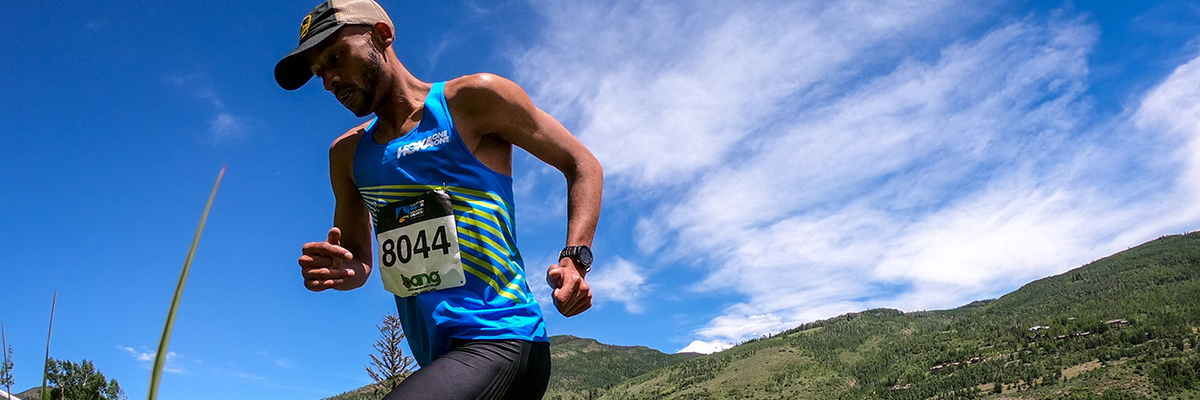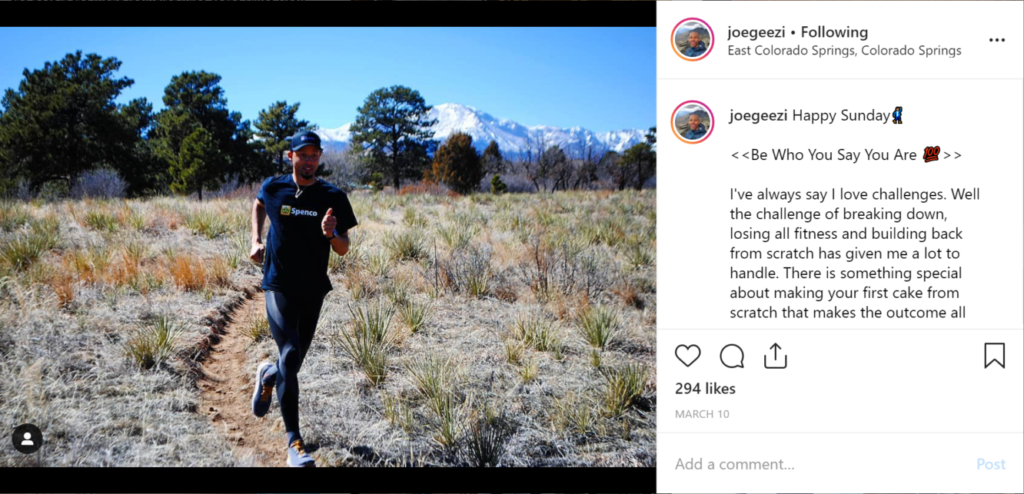Posted by: Katie Coakley
Running champion Joseph Gray opens up about fighting beyond the mental and physical barriers of injury
By Shauna Farnell
Since winning his fifth straight 10-kilometer GoPro Mountain Games trail race last year, Joseph Gray has confirmed that “the runner’s high” is a very real thing.
When he was forced to stop running for three months over the winter, he got pretty low.
One of the most recognizable heroes of the Games, the 35-year-old Colorado Springs resident is the guy you always see loping serenely across Vail Mountain all by himself, often minutes ahead of the other pro runners. The pace of his relaxed trot is a full-blown sprint for most of us.
After handily defending his 10K title at last summer’s Games and then – the same day – winning his first Pepi’s Face-Off (he did six laps up and down the wall-like slope in 32 minutes), Gray made what initially seemed like a harmless misstep while training a few weeks later.
He was wrapping up a trail run and accidentally stepped into a hole. It sent jarring pain into his hip and groin, but he did his best to shake it off and continued to race … and win. He landed his 14th USA Mountain Running Championship and defended his Xterra World Trail Run title. But the pain in his groin and SI joint became worse and worse.
“I was kind of battered after that,” he says. “I tried to come back a couple of times, but it didn’t work.”
Growing up outside of Tacoma, WA, Gray’s military father was an avid basketball player and Gray’s first athletic role model. In college at the University of Portland and Oklahoma State, Gray moved up the ranks in track and cross-country. He completed a graduate degree in Criminal Justice but was drawn to the mountains and the trail. In 2009, he won his first USA National Mountain Running Championship, becoming the first Black American in history to do so. From that point on, he’s finished on top in nearly every race he’s entered, earning countless national and world trail running titles, setting the American record at the Mount Washington Road Race and dominating the lung-busting Pikes Peak Ascent that takes racers more than 13 miles and more than 6,000 vertical feet up to the finish line at 14,115 feet. He’s passionate about encouraging racial diversity in trail running and dedicates his time to projects such as Inspire Diversity, which creates athletic opportunities for young minorities.
However, by the time 2018 came to a close, Gray was forced off running and was undergoing treatment for strained groin and inflammation of the SI joint.
“It was a lot longer time off than I expected. It put me in a depressed state,” he says. “Running is a sport that brings me a lot of joy. I hadn’t had any breaks. It put me in a bad place.”
Gray was sidelined from the end of December through March. Without the simple focus of putting one foot over the other at high speeds and the endorphins that come with it, he slipped into a funk.
“It’s definitely tough. You don’t have that stress relief, that freedom of your mind. When you’re not working out, you’re stuck in a negative mindset. I felt like I have a responsibility to promote my brands and stay injury-free and to be out there racing and give them that exposure. It is my job security. Without it, there are a million negative thoughts that plague your mind daily. You start to stress about not providing for your family and paying bills. That weighs on you pretty heavily. When you feel inadequate, your self-image changes.”
As the pain began fading after the extended rest, Gray slowly began making his way back to training but was faced with the harsh reality that his fitness level had plummeted.
“When you come back, obviously you’re not in the best fitness. I’m trying to run with my group and these guys, they’re not injured; they’re getting ready for races. It’s very humbling,” he says. “When I initially started coming back, the women on our team were right there on me. When you’re not able to run with the pack of guys you’ve run with for years, you start to wonder if you can ever get back to that fitness. I had to say, OK, if I have to run with the ladies, I’ll run with the ladies. Our ladies are really damn fast. These women are 32-minute 10K runners. I had to change my perspective because I’m thinking I have to be up there with the 27-minute guys like I’ve always been. I had a lot of self-doubt. I lost faith in my abilities. I felt like I was never going to be a good runner again. It was tough mentally to know I was running times I was able to jog a couple of months ago.”
 Getting back up to speed, especially at Gray’s elite level, does not happen overnight. But coming into the 2019 GoPro Mountain Games, his first competition coming back from injury, Gray is in a better place than he was several months ago, both physically and mentally.
Getting back up to speed, especially at Gray’s elite level, does not happen overnight. But coming into the 2019 GoPro Mountain Games, his first competition coming back from injury, Gray is in a better place than he was several months ago, both physically and mentally.
“Now I can run pain-free. That’s been really nice. In the past, especially in those first few weeks back, the new normal was being in pain. I wasn’t able to work out much. You need a couple of good workouts to get that confidence back. Running with a group of guys again, you start to get that confidence back. You’re able to press harder and make bigger gains,” he says.
Besides working harder and pushing more with every workout, Gray credits his father for lifting his spirits and pulling him out of his emotional rut during his downtime.
“This winter I said to my dad, ‘I have this injury.’ He said, ‘Don’t worry about it. Stay focused.’ It went from that to him calling me every day. He knows me. He knew I was depressed. So he’s calling me two and three times a day. I’m thinking, why is this man calling me all the time? I look back on it now and I think it’s a blessing. I realized I needed someone to talk to. It was a blessing in disguise.”
For any athlete working through injury and/or sinking into a dark state of self-doubt, Gray emphasizes the importance of keeping loved ones close.
Let people know how you feel. People have the tendency to hide what they feel about life, or their body or their self-image.
“The biggest thing is to make sure you have balance in your life, making sure you have people who genuinely care about you,” he says. “Let people know how you feel. People have the tendency to hide what they feel about life, or their body or their self-image. These are things people try to save face with. Keep close ties with your family and friends and let them know how you’re feeling. When you’re dealing with an injury, it can escalate really quickly because you’re keeping it all inside. An injury is a physical thing but it can also become a mental thing. If you have a good support group to help you with the mental side, it’s key.”
Although Gray hasn’t had the pre-season preparation he’s had in previous years, his perspective is elevated and his goals remain the same coming into these Mountain Games.
“Any race I line up, the ultimate goal is to win,” he says. “I want to repeat there but if that doesn’t happen, I want to go out and put in a solid performance to build off of for the rest of the season. I was in a bad place two months ago. Today, I’m more confident, more sure of myself. I know I can compete. I’m in a good place. I’ve learned to look at it differently, knowing it’s not my whole life.”
Run with Joe
Joe Gray is leading a free fun run from the Vail Athletic Club on Friday morning at 7 a.m. Runners of all ages and abilities are welcome to participate.
Share this Story:























